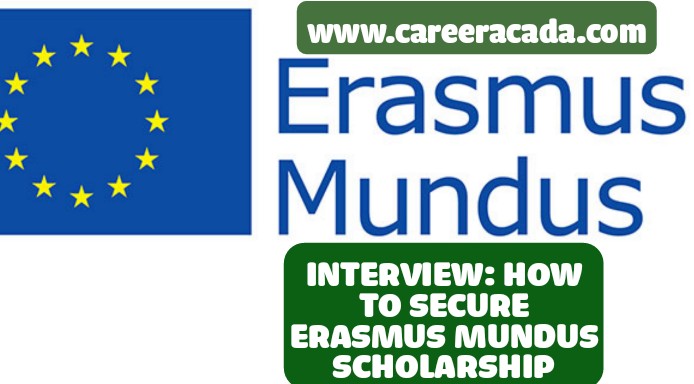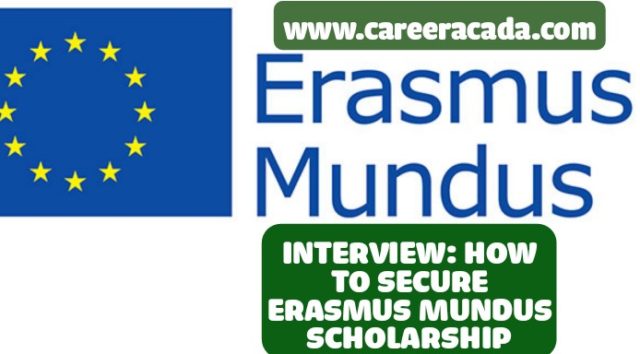Are you thinking of how to secure the Erasmus Mundus Scholarship?. I’m glad to let you know that, you’re in the right place.
Erasmus Mundus scholarship is a highly competitive scholarship sponsored by the European Union.

The scholarship is available for both the European Union and Non-European students.
In an interview with one of the Erasmus Mundus Scholarship awardees Tomiwa Oluwajuwon at scholarship gurus group chat. He gave some insight into how to secure the scholarship.
Introduction
The European Union, through the European Commission, has a number of ways of providing supports to the world, via various agencies. Some of these encompass the sectors of youth empowerment, education, sports, economies, culture, and lots more.
Specifically, the Education, Audiovisual and Culture Executive Agency (EACEA) manages the Education aspect and has instituted a number of Scholarship programmes, among which is the Erasmus Mundus Joint Master’s Degree (EMJMD) Scholarship.
As we may have known that the European Union has about 28 member countries, hence, an EMJMD opportunity will take you to at least 2 of these countries. Imagine you get to enter a country from where you can use your Schengen Visa to travel to almost all other European countries!.
Isn’t that a nice and life-changing experience? I bet it is!
Now, let’s take ourselves through the EMJMD properly.
READ ALSO:
What you Need to Know about Studying in Germany
WHAT’S EMJMD?
EMJMD or better say, Erasmus Mundus Scholarship, is a prestigious scholarship programme that has about 120 component programmes delivered jointly by two – four universities in different European countries (while a few may have one or two of their partnering universities outside Europe).
Note: A candidate is expected to apply for only at most, three (3) programmes within an application season (anything above this leads to disqualification). Each of the programmes mostly lasts for a maximum of 2 years (while there may a few exclusions for 1yr).
The period you spend in a university depends on the specific mobility of the programme. While some programmes have their students spend every semester in different universities (making 4), others like mine would be a whole session in each of the 2 universities.
At the completion of your Master’s programme, you will either be awarded a single Master’s Degree(jointly issued by all the universities in your mobility) or mostly, different Masters’ Degrees by each
university. This however varies with programme.
Most fascinatingly, EMJMD is quite a juicy one, based on its scholarship coverage, which encapsulates:
Participation Costs: This is directly paid to the programme’s consortium (universities) for the tuition fees and health insurance.
Travel support costs: €3000 to fund your visa and flight costs. This is paid twice! The second will be paid as you plan to move to the second-year mobility university.
However, this could be reduced to €2000 if the distance between your residence in Nigeria and your (coordinating) university in Europe is less than 4000Km.
Installation costs: €1000 paid once, usually to help with the settling-down.
Monthly living costs: €1000/month, which is paid for the 24 months (2 years). Isn’t this lovely?
READ ALSO:
How HND Holder Secure Master’s Erasmus Mundus Scholarship offer
How can we Apply?
The mode of application is similar to other scholarship programmes with just very little peculiarities. Usually, the application portals for most programmes open between August and January, some still extend to February though.
First of all, you will have to use this link to access the catalogue of the programmes and identify at most three programmes that interest you or are relevant to your first degree.
Please note that it’s possible that you do not find a programme/course that is directly related to your first degree, in terms of the Programme’s Name.
However, what you are expected to do is to surf for the qualification requirements of the potential ones.
Take for instance, in this current Nigerian Erasmus Mundus cohort, I have seen a graduate of Agriculture win a programme named “EIMAS- European Interdisciplinary Masters African Studies”. So, it’s not just about the Name, when identifying a programme to apply for, it’s about your degree (and your experience) meeting its requirement.
After you must have identified your intending programmes, you will have to proceed to their respective websites to read up about what they entail and their application procedures.
WHAT ARE THE COMMON BASIC APPLICATION REQUIREMENTS?
- Academic Transcripts: Get your academic transcripts ready. As much as I would want to agree that Erasmus Mundus encourages academic excellence, as they consider academic grades as a major component of assessment with the minimum generally-acceptable grade points to be 70%. Yet, your relevant experiences (portrayed through research, conferences, works, etc.) and your well-articulated motivational letter are expedient.
- Degree Certificate: Obtain your certificate as well. However, this is usually never compulsory, as an Attestation or Statement of Result is a better substitute.
- Evidence of English Proficiency: To be candid, I have completely applied for three programmes before I got to know that there are some programmes that are strict with the requirements of English Tests, most preferably, IELTS. If your programme is like mine, all you need is an English as a Medium of Instruction letter from your first-degree University, and this will suffice.
- Recommendation Letters: As you and I know that hardly is there a graduate scholarship or an
admission that wouldn’t request for this letter. Hence, it’s a mandatory requirement for all EM
programmes. Most will request for two, while a few for three. Some will request for blind recommendations while many others will ask you to upload the recommendation letter by yourself. You may want to try to avoid the use of “to whom it may concern” salutation, and address the recommendation letter to “The Program Coordinator, or Selection Committee”.
- International Passport: This is very compulsory unless otherwise stated (rare). Almost all foreign
scholarships demand this. I’m sure that in no time, the pandemic will subside and immigration offices
will reopen. Get yours, if you don’t have one! - Certificate of Residence (CoR): Earlier, I didn’t mention that for Erasmus programmes, there are partner countries among which is Nigeria (others being India, Bangladesh, Brazil, Pakistan, etc. I must tell you that these guys are acing this scholarship well). But we thank God that Nigeria is improving with more than 80 awardees in this 2020-2022 cohort if I’m correct. Also, there are programme countries, mostly European. Consequently, Erasmus has a regulating policy and it’s that they want to be assured that an applicant from a Partner Country, like Nigeria, has not lived in Europe for more than 12 months within the past 5 years. Hence, a need for this Certificate. So, how can you obtain this Certificate of Residence? Certificate of residence is a letter certificate that can be obtained from your current place of work or study, your first- degree university (exactly what I did), your local government, a law court as an affidavit. The most important pieces of information that must be presented by this certificate of residence are: your full name, passport number, your full address, how long you have been staying there, and date of issuance.
- Academic CV: Erasmus uses the EUROPASS format –it’s a tabulated CV format. You can easily build one for yourself and download afterwards, through this link.
It’s expedient that you have a nice and convincing CV that can present your research experiences, skills, trainings/seminars, conferences/MOOCs, leadership and what have you. - Letter of Motivation (LOM): The last but not the least is letter of motivation. Note: It can be asked in different formats, as it varies with programmes. However, a common approach to writing this, successfully, requires that you read about and understand the programme first off, before starting to compose one at
all. Ensure that the content of your letter of recommendation is relevant to what the programme has to offer or is about.
I would advise you to join Erasmus-Mundus Nigeria on Facebook to keep up with the information about the Erasmus Mundus programme and possibly get the mentioned document. Ensure people review the letter of motivation.
What are the various possibilities of results after application?
- Usually about 1-3 months after deadlines. It is imperative to note that not everyone that is accepted for an EMJMD programme will be funded by or availed the Erasmus Mundus scholarship. Most programmes can only accept between 20-25 candidates for the scholarship award, approximately.
Hence, the following responses may arise:
- You have been accepted into the programme and have won an EMJMD scholarship; this translates to a direct success.
- Being placed on a Reserve List: This still has some hopes therein, as it means that you’ve been enlisted among those that will be first considered, in case anybody wishes to reject his/her scholarship offer. This is very common since many might have won more than one programme at a time! Some programmes even publish their offers’ lists. By this, one would get to know one’s rank on such a result list.
- Being admitted into the Master’s programme, but as a Self-funded student or perhaps, one personally looking forward to other agencies for sponsorship.
- The last is being rejected outrightly. That is, one’s application package doesn’t fit in for the programme at all, and hence NO ADMISSION.
Above all, it’s our desire and prayer that each of our efforts comes to fruition!.
One lasting word?
I have mentioned earlier that Erasmus Mundus Scholarship is a prestigious and multidisciplinary one, as such, the mobility across Europe makes it far more exceptionally great.
However, it also comes with a seeming limitation –Erasmus Mundus doesn’t pay until you arrive at your first (or coordinating) university and open an account with them (although, this seems to have been compromised by the Covid-19, as a few programmes have promised to pay the monthly stipends to students who will be unable to resume physically, but rather through online mode from Nigeria.
Therefore, unlike some other scholarships, visa processing, flight ticket to Europe, documents legislation and other miscellaneous (as the case may be) would have been covered by you at first.
Nonetheless, be rest assured that once you resume for your programme, your first outright payment of 5000 Euros (€3000–travel, €1000–installation, and €1000–first month) will offset these bills.
Another juicy part is the pre-departure programme usually held in Abuja before you travel for your programme, hosted by the EU Ambassadors, where accommodation and flight to Abuja will be provided.
Sadly, we still don’t know how this event will play out this year, as a result of Covid-19.
In short, EMJMD is worth applying for! It’s the most stress-free scholarship that I’ve ever applied for.
Frequently Asked Questions
It cover tuition fees, travel, installation and other bills.
Yes. It is available for both European and non European union students
The monthly stipend is €1000 for 2 years.
Go for it! Ace it! I wish you the best!!!
Career Acada Team wish you the best in your pursue for academic excellence.


Adeyinka is the founder and content creator at Career Acada. He’s a technology expert and web developer. He holds a degree in Genetics and loves impacting life for a better society.










